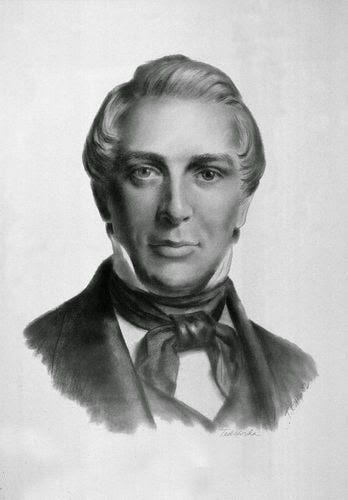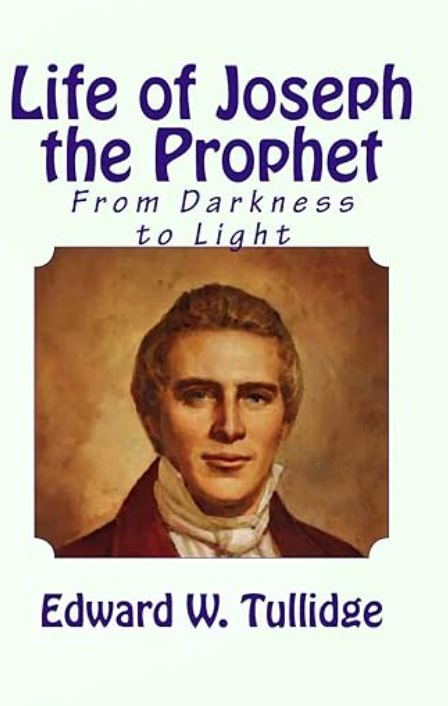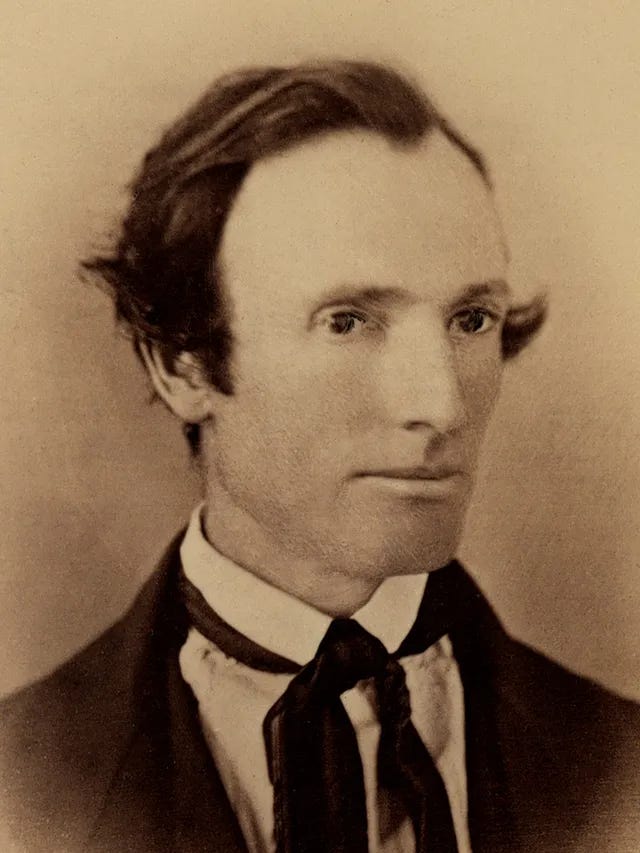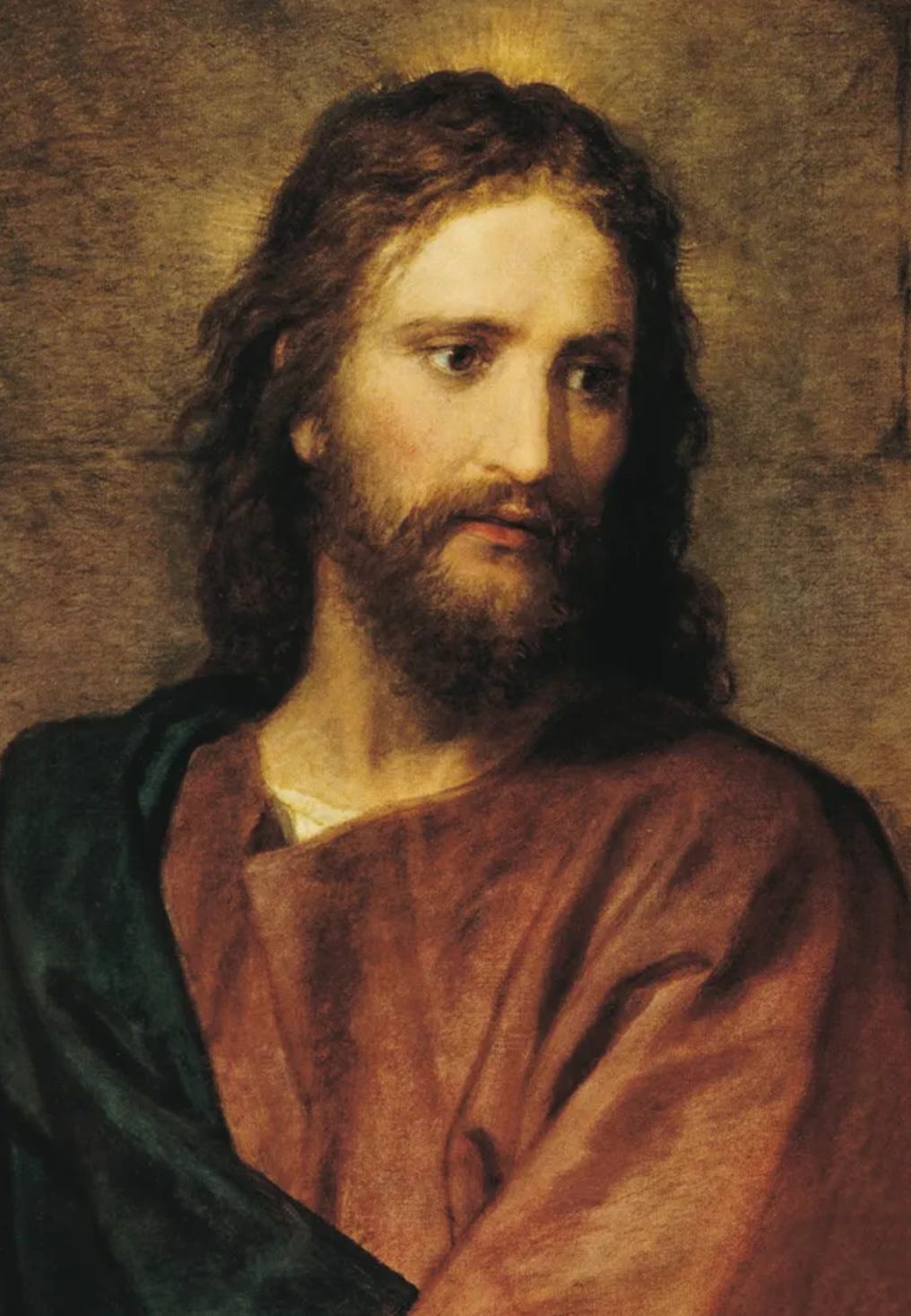You Cannot Say Enough in the Lord's Cause
Reflections on Doctrine and Covenants 24
In the previous post I outlined the historical background for Doctrine and Covenants 24. Those of us who are experiencing afflictions, persecutions, trials, tribulations, and troubles of any kind may derive strength, courage, hope, peace, guidance, and instruction from these verses.
Because there are three distinct revelations combined into one section, we can examine each revelation at a time.
The Revelation to the Prophet Joseph Smith:
Behold, thou wast called and chosen to write the Book of Mormon, and to my ministry; and I have lifted thee up out of thine afflictions, and have counseled thee, that thou hast been delivered from all thine enemies, and thou hast been delivered from the powers of Satan and from darkness!
Nevertheless, thou art not excusable in thy transgressions; nevertheless, go thy way and sin no more.
Magnify thine office; and after thou hast sowed thy fields and secured them, go speedily unto the church which is in Colesville, Fayette, and Manchester, and they shall support thee; and I will bless them both spiritually and temporally;
But if they receive thee not, I will send upon them a cursing instead of a blessing.
And thou shalt continue in calling upon God in my name, and writing the things which shall be given thee by the Comforter, and expounding all scriptures unto the church.
And it shall be given thee in the very moment what thou shalt speak and write, and they shall hear it, or I will send unto them a cursing instead of a blessing.
For thou shalt devote all thy service in Zion; and in this thou shalt have strength.
Be patient in afflictions, for thou shalt have many; but endure them, for, lo, I am with thee, even unto the end of thy days.
And in temporal labors thou shalt not have strength, for this is not thy calling. Attend to thy calling and thou shalt have wherewith to magnify thine office, and to expound all scriptures, and continue in laying on of the hands and confirming the churches. (D&C 24:1-9)
These remarkable verses teach us much about the Lord’s relationship with His Prophet Joseph, about Joseph Smith’s calling, about the foundations of Zion, and about the way in which the Lord promised to communicate to His people. Thus we see, once again, the central role of the Book of Mormon in laying the foundations of the Church of Jesus Christ and of Zion. The Lord called Joseph Smith to His work, lifted him up out of his afflictions, counseled him, and delivered him from all of his enemies, especially from the powers of Satan and from darkness! This first verse encapsulates everything that we have studied thus far about the Prophet Joseph Smith’s life.
In essence, the Lord reminded the Prophet Joseph Smith what He had already done for him, and then He, the Lord, firmly but lovingly called him to repent, to magnify his his office, to do his work, and to minister to the three existing branches of the budding Church of Jesus Christ. The Lord also commanded Joseph to continue to pray, write, and expound scripture by the Comforter.
In these verses we begin to glimpse the connection between the word of God as revealed through ancient scripture, such as the Book of Mormon and the newly translated first Book of Moses, and the word of God as revealed through modern revelation, that is, directly through the Prophet Joseph Smith. As important as ancient scripture is - and clearly it is central to the foundations of the Church of Jesus Christ - in these verses the Lord declares that He will reveal more, by the Holy Ghost (the Comforter), through the Prophet Joseph Smith’s speeches and writings.
Moreover, the Lord promised to bless the people of His Church both spiritually and temporally if they would listen to and faithfully receive Joseph Smith’s words. Joseph Smith was becoming a modern Moses, or a modern Isaiah, a prophet in every sense of the word. The Lord commanded Joseph to consecrate himself entirely to Zion, to the work of the Lord. He counseled Joseph to be patient in afflictions and to endure them. Anyone who has carefully and thoroughly studied the life of the Prophet Joseph Smith knows that, because the Lord was with him, he patiently endured many afflictions.
The Smith and Sjodahl commentary on these verses is enlightening:
As the Church membership increased, the adversary marshalled his forces, and the fires of persecution were kindled. At Colesville, where many were anxious to join the Church, a mob tried to prevent this by tearing up a dam which had been built over a stream, to get a convenient place for baptism. The dam was rebuilt and the ordinance performed. The mob then surrounded the house of Joseph Knight, where the Prophet bravely confronted them. At the house of Newel Knight, Joseph was arrested on the charge of “setting the country in an uproar” by preaching the Book of Mormon. The purpose, it has been supposed, was to waylay the Prophet on his way to court, but this plan was not carried out. Witnesses had been summoned, who were expected to testify that the Prophet had received property from them, by fraud, but they testified to the contrary, and he was acquitted. Again he was arrested. The officer treated him very harshly, and the rabble rejoiced. But again he was acquitted. This infuriated the mob, and the bitterness increased, as they realized that their attempts at persecution by the aid of the courts were futile. See History of the Church, Vol. 1., pp. 86. 90.
It was shortly after this trying time that the Prophet received the Revelation called “Visions of Moses” (Pearl of Great Price, p. 1), and Sections 24, 25, and 26, Doc. and Cov.
Called and chosen] The Prophet Joseph was “called and chosen” to give to the world the Book of Mormon and to engage in the ministry. God called him, through the Angel, and when he manifested his willingness to obey the call, he was chosen for the work. The call preceded the election. “Many are called, but few are chosen” (Matt. 22:14). “When I called, ye did not answer” (Isa. 65:12). The call always precedes the election: “Give diligence to make your calling and election sure” (II. Peter 1:10). He who is called, is sure of his election, if he obeys the call.
I have lifted thee up] God had rescued the Prophet from the persecutors, as He had delivered him from the power of the adversary when he first sought God in prayer.
Sin no more] The Prophet Joseph did not claim to be perfect; nor would the Lord have permitted him to indulge in Pharisaic self-admiration, even if he had been so inclined, for He reminded him of his failing and his need of repentance, when necessary, to keep him humble. The Prophet had not fallen into transgression, but in one highly favored by the Lord, a word, an act, which would hardly be noticed in another, may be a “sin.”
- 4. The Saints in Colesville, Fayette, and Manchester are here told to contribute to the support of the Prophet; not to pay him a salary, but to supply his wants. The law of tithing had not yet been given to the Church.
5. - 9. The Prophet Joseph’s gifts were of a spiritual, not financial nature, but the Lord promised him that, if he would magnify his calling, he would always have what he needed. Financial ability is also a gift that can be used to the glory of God, but the Prophet was not a financier. He did not live for the accumulation of wealth. The Kingdom of God was his first and chief concern. It has been stated that the sum total of his worldly possessions, probably, never at any time exceeded two or three thousand dollars, although he always contributed liberally towards all public, worthy objects. At his death the administrator could allow the widow only. $124 a year from the estate (Tullidge, Life of Joseph The Prophet, p. 744)
This is a great new find for me… I’ve read many books by and about the Prophet Joseph Smith, but I’ve not yet read Tullidge’s 843 page tome. If any one of my readers has read Tullidge’s Life of Joseph The Prophet, please tell me about it.
The Revelation to Oliver Cowdery:
And thy brother Oliver shall continue in bearing my name before the world, and also to the church. And he shall not suppose that he can say enough in my cause; and lo, I am with him to the end.
In me he shall have glory, and not of himself, whether in weakness or in strength, whether in bonds or free;
And at all times, and in all places, he shall open his mouth and declare my gospel as with the voice of a trump, both day and night. And I will give unto him strength such as is not known among men. (D&C 24:10-12)
I love this brief revelation to and for Oliver Cowdery. It contains wonderful counsel and a marvelous promise. I especially love this gem from the Lord: “And he shall not suppose that he can say enough in my cause.” It reminds me of the great missionary Ammon in the Book of Mormon. In fact, this brief revelation contains language that seems to be drawn directly from the story Ammon:
Therefore, let us glory, yea, we will glory in the Lord; yea, we will rejoice, for our joy is full; yea, we will praise our God forever. Behold, who can glory too much in the Lord? Yea, who can say too much of his great power, and of his mercy, and of his long-suffering towards the children of men? Behold, I say unto you, I cannot say the smallest part which I feel. (Alma 26:16)
But Ammon said unto him: I do not boast in my own strength, nor in my own wisdom; but behold, my joy is full, yea, my heart is brim with joy, and I will rejoice in my God.
Yea, I know that I am nothing; as to my strength I am weak; therefore I will not boast of myself, but I will boast of my God, for in his strength I can do all things; yea, behold, many mighty miracles we have wrought in this land, for which we will praise his name forever. (Alma 26:11-12)
It also reminds me of why Nephi and his brother Jacob wrote:
And we talk of Christ, we rejoice in Christ, we preach of Christ, we prophesy of Christ, and we write according to our prophecies, that our children may know to what source they may look for a remission of their sins. (2 Nephi 25:26)
What was the Lord’s promise to Oliver Cowdery if he would obey the commandment to open his mouth and declare the gospel of Jesus Christ at all times and in all places, both day and night, as with the voice of a trump? Ponder the promised blessing for obedience to this commandment: “And I will give unto him strength such as is not known among men.” (D&C 24:12)
The Smith and Sjodahl commentary on these verses is thought provoking:
10-12. One evidence of the divine origin of the Church is found in the fact that each member was given the work for which he was best equipped. Oliver Cowdery was instructed to continue preaching the gospel, his special gift being eloquence, as is apparent from his graphic description of the ordination to the Priesthood, Pear of Great Price pp. 98-99.
I agree with this commentary to some extent, although it also seems true that another evidence of the divine origin of the Church is that the Lord accomplishes mighty works through the weakness and in spite of the imperfections of His servants.
The Revelation Relative to Miracles, Cursings, Casting Off the Dust of One’s Feet, and Going without Purse or Scrip:
Require not miracles, except I shall command you, except casting out devils, healing the sick, and against poisonous serpents, and against deadly poisons;
And these things ye shall not do, except it be required of you by them who desire it, that the scriptures might be fulfilled; for ye shall do according to that which is written.
And in whatsoever place ye shall enter, and they receive you not in my name, ye shall leave a cursing instead of a blessing, by casting off the dust of your feet against them as a testimony, and cleansing your feet by the wayside.
And it shall come to pass that whosoever shall lay their hands upon you by violence, ye shall command to be smitten in my name; and, behold, I will smite them according to your words, in mine own due time.
And whosoever shall go to law with thee shall be cursed by the law.
And thou shalt take no purse nor scrip, neither staves, neither two coats, for the church shall give unto thee in the very hour what thou needest for food and for raiment, and for shoes and for money, and for scrip.
For thou art called to prune my vineyard with a mighty pruning, yea, even for the last time; yea, and also all those whom thou hast ordained, and they shall do even according to this pattern. Amen. (D&C 24:13-19)
The Smith and Sjodahl commentary (pp. 126-27) on these verses is instructive:
13-14. Miracles are not to be asked for as evidences of the truth of the gospel: the Spirit will testify of the truth of it. And yet, when required by those who humbly desire a blessing, to cast out demons, to heal the sick, or to counteract the effects of poison, a servant of the Lord must not refuse to administer. The Scriptures must be fulfilled.
Do accordingly to that which is written] The written word, properly interpreted, is the pattern.
-19. These verses contain instructions to missionaries.
15. A cursing instead of a blessing] The entrance of an Elder into a home with the gospel message will be either a blessing or the opposite, just as the mild spring rain and genial sunshine bring luxuriant verdure to the living plants, but dissolution to the stubble that is dead.
Casting off the dust] Our Lord instructed His Disciples to shake the dust off their feet, when departing from a house where they had not been received (Matt. 10:14). Paul did so when leaving Antioch, in Pisidia (Acts 13:51). Those who rejected the gospel message were to be considered as pagans, with whom Jews held no social intercourse. Even the dust of their dwellings and their cities, was to be treated as defilement, necessitating a cleansing. But this is not an act to be performed on slight provocation. A disciple of the Lord must learn of Him patience and long-suffering.
The Lord endowed His servants with power and authority, but these must be used for the salvation of souls.
Cursed by the law] Oliver Cowdery needed this warning. One of the charges brought against him in 1838 was that he had turned from his calling to the practice of law, “for filthy lucre,” and that he had been urging vexatious lawsuits. He needed to be reminded that those who would persecute others by law would be “cursed by the law.” Lawsuits are to be avoided, if possible.
“Does the Lord love your conduct when you drag each other before the ungodly? When you run after difficulties, contentions, broils, and strife? Do you think He has fellowship with your conduct in such things? No, you do not. Do you suppose that Jesus Christ has? No. Do you believe that angels and good men can fellowship your conduct? You do not?” (Brigham Young, Jour. of Dis., Vol. III., p. 239).
Brigham Young adds that there is not a righteous person who has difficulties that cannot be settled by arbitrators.
No purse nor scrip] To go without “purse and scrip” is, in modern language, to travel without money and trunk. “Scrip” is a “satchel,” a “knapsack.” When our Lord sent His Apostles on their first missionary journey, He charged them not to take with them money or money belts; nor “scrip,” such as David carried when he went to meet Goliath; nor a change of clothes. Simplicity was to be one of their characteristics. Socrates, long before this time, wore only one coat, or tunic, went without sandals, and subsisted on the bare necessities of life. Epicurus taught, “To whom a little is not enough, nothing is enough,” and it was said of him, “This fellow is bringing in a new philosophy; he preaches hunger, and disciples follow him.” Oour Lord, too, taught the philosophy of the simple life. He taught His followers to rely on God for all their needs. The same lesson is taught in this Revelation. Brigham Young says:
“For me to travel and preach without purse and scrip was never hard; I never say the day, I never was in the place, nor went into a house when I was alone, or when I would take the lead and do the talking, but what I could get all I wanted. *** I could make the acquaintance of the family, and sit and sing to them and chat with them, and they would be friendly” (Jour. of Dis. Vol. IV., p. 34)
Revelations and miracles do not keep men from falling.
“I recollect, in the upper room of the Temple in Kirtland, Ohio, when we were assembled there, a very noted man, Sylvester Smith, bore testimony of what he had seen of the Prophet of God, of angels, etc. He said ‘*** I have spoken by what you call the Holy Ghost; the eyes of my understanding have been touched, and I have seen convoy after convoy of angels; I have laid hands on the lame, and they have leaped like a hart; I have spoekn with tongues and had the interpretation thereof; but, let me tell you, everything I have seen, and everything you have seen, is the height of idiotism.’ This was Sylvester Smith, after he had apostatized” (Jedediah M. Grant, Journ. of Dis., Vol. VI., p. 254).
In Christ’s Church I have both participated in and been the beneficiary of miracles, casting out devils, healing the sick, and protection from deadly poisons, but my testimony of Jesus Christ comes from the witness of the Holy Ghost, and not from reliance upon miracles.
Have I ever cast off the dust of my feet against anyone as a testimony? Because this is not an act to be performed on slight provocation, I have, in the face of much rejection, preferred to err on the side of mercy and learn patience and long-suffering from the Lord. Even toward those who have laid their hands upon me by violence, I desire to err on the side of mercy, unless and until the Lord requires otherwise.
Have I ever preached the Gospel and travelled without purse or scrip, staves, or two coats? We packed lightly as missionaries, but not quite this lightly. I wonder about changes in the way that missionary work has been conducted since the time of the restoration until now.
Whatever the case, let us go forth to prune the Lord’s vineyard with a mighty pruning, yea, even for the last time.







